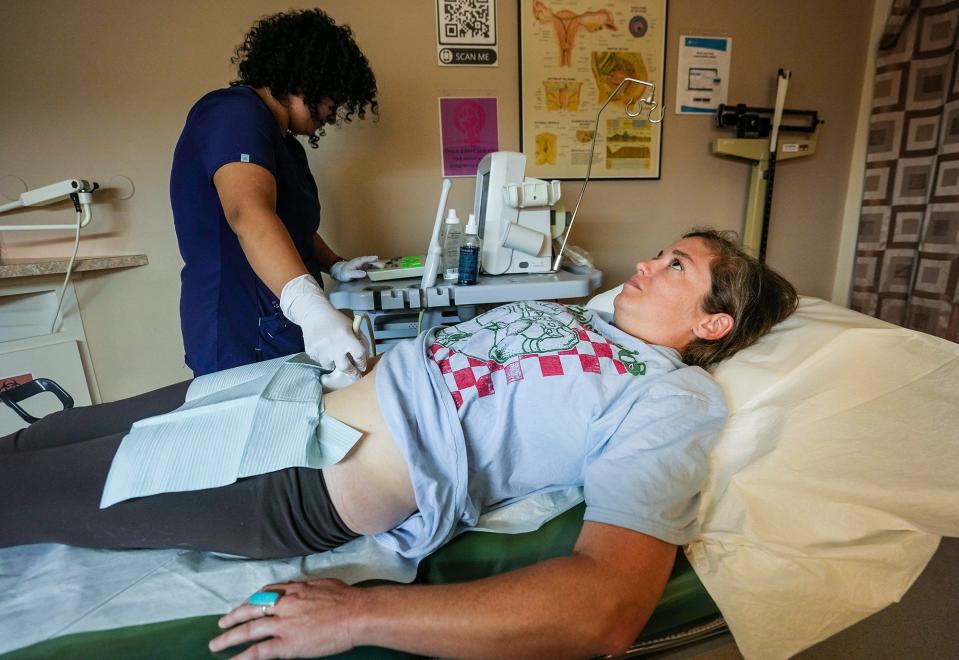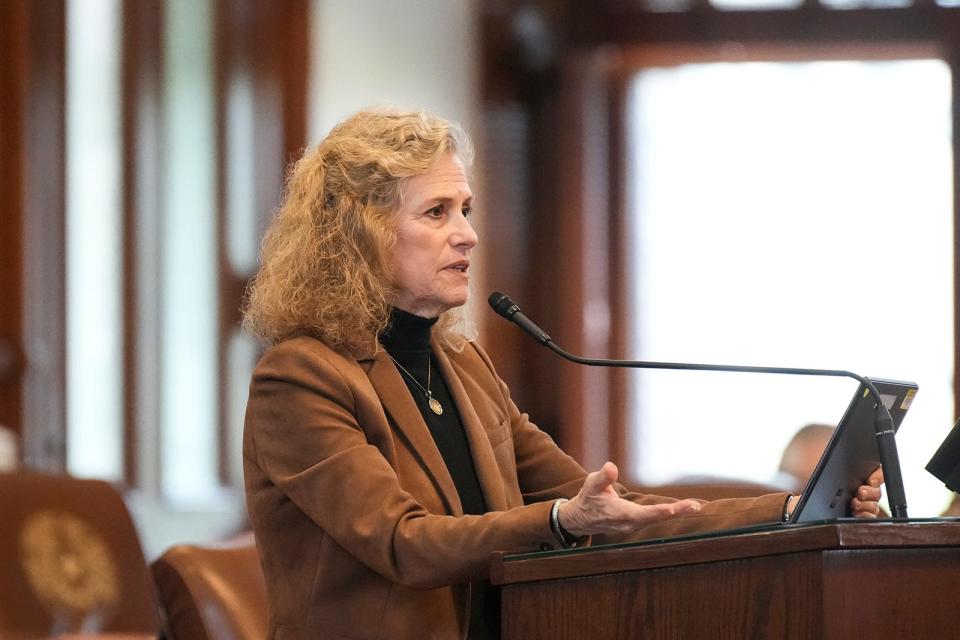Abortion foes, supporters say Texas maternal death task force should review abortion cases
- Oops!Something went wrong.Please try again later.
A sponsor of a Texas law that has prohibited the state's maternal death task force from reviewing abortion records — a measure that has left gaps in maternal mortality data for more than a decade — is considering changing the rule to bring it up to standards set by the Centers for Disease Control and Prevention, the Statesman has learned exclusively.
Groups on both sides of the abortion rights debate also support a potential change, the Statesman found. But the path to compromise on an amendment could be tenuous.
"Excluding abortions means the committee will be missing a big piece of the puzzle," Rep. Armando Walle, D-Houston, told the American-Statesman about the 2013 bipartisan law — Senate Bill 495 — that created the Maternal Mortality and Morbidity Review Committee to analyze cases of "pregnancy-related deaths." A one-sentence provision in the bill excludes deaths of women whose pregnancies ended in abortion from being reviewed by the committee.
Texas lawmakers established the MMMRC after a dramatic increase in reported maternal deaths took place in the early 2010s. By analyzing anonymous records of those deaths and the decedents' health conditions preceding them, the group was able to determine that accidental fatalities, such as in car crashes, had been erroneously labeled as pregnancy-related incidents.
The committee’s 2022 report, which found that 90% of Texas maternal deaths were preventable, helped push the Legislature to extend access to Medicaid for 12 months postpartum. The report also found that Black women disproportionately died of pregnancy-related causes.
Read part one of this story: Texas maternal death task force can’t review abortion cases, contrary to CDC guidance
The omission of mortality data for women whose pregnancies were terminated has dumbfounded OB-GYNs on the committee as well as Dr. Charlie Brown, a maternal-fetal medicine specialist and former chair of the Texas chapter of the American College of Obstetricians and Gynecologists, who told the Statesman that he "can't think of any reason why they would exclude that." Brown emphasized that leaving out such cases could skew pregnancy-related mortality rates, which are measured as the number of deaths per 100,000 live births.
Having abortion-related maternal mortality data would "better inform us of what's happening with women in Texas during pregnancy and the postpartum period," said MMMRC vice chair and maternal-fetal medicine specialist Dr. Patrick Ramsey.
The American-Statesman reached out to lawmakers and advocacy groups involved in maternal health legislation, including each of six sponsors and authors of SB 495, to ask whether they support striking the provision.
Walle told the Statesman last Monday that he was exploring a change to the law but expressed some concerns related to privacy.
"The GOP-led Legislature banned abortion and made every attempt to criminalize doctors and women in the process," Walle said. "I am currently working with subject matter experts and advocates to thread that needle so that the data collected paints a full picture without putting Texans at risk."

The Statesman on Thursday first reported that the state-mandated data omission conflicts with CDC recommendations.
“CDC guidance is that Maternal Mortality Review Committees (MMRCs) review all deaths that occurred during pregnancy through the year after the end of pregnancy,” CDC spokesperson Nick Spinelli told the Statesman in an email. “This includes pregnancies that ended in abortion.”
Reproductive rights advocates, such as Planned Parenthood, have said they hope the data can reveal the effect of Texas' strict abortion bans. They've long held that restrictions on terminating pregnancies would increase unsafe, off-the-books abortions and make it more difficult for women facing dangerous pregnancy complications to seek care.
On the other hand, anti-abortion groups, such as Texas Alliance for Life and Texas Right to Life — confident in the policies for which they have lobbied — are interested in learning more about abortion-related complications.
"In our view, the law is saving unborn babies' lives and saving women's lives," Texas Alliance for Life Director Joe Pojman told the Statesman in a May 9 phone interview.
Pojman said he would like to see the committee find out how many past elective terminations resulted in complications or death because "it's anybody's guess whether providers are complying" with complication reporting requirements.
“Let’s see how many complications or deaths are the result of elective abortions in Texas,” Pojman said. “That would be a very important thing for the committee to consider.”
Dr. Amna Dermish, chief operating and medical services officer at Planned Parenthood of Greater Texas, also expressed concerns about omitting abortion-related death data, saying that "Texas’ political leadership has consistently undermined women’s health and politicized reproductive health care."
"In order to meaningfully prevent maternal deaths in Texas, public health leaders should be able to consider all factors impacting maternal mortality, while preserving patient privacy, including lack of access to abortion, prenatal, postpartum and related medical care," Dermish wrote in a statement to the Statesman on Thursday.

Abortion rights proponents, foes concerned about lack of data
Several Democratic lawmakers, abortion rights groups and anti-abortion groups have told the Statesman they would like to see the law changed to include the missing data, though their motivations might differ.
Rep. Shawn Thierry, a Houston Democrat and attorney who sponsored a 2023 law renewing the MMMRC's mandate, said the abortion data omission might contradict aspects of the statute that instruct the committee to review pregnancy-related deaths and inform the public about how to prevent them.
A Black mother who has spoken about her near-death experience during childbirth, she said she thinks all cases can advance the committee's mission.
"My position is we want as much information as possible to save women's lives and that this is the only way we can do it," she said. "We just need data. Not knowing is not helping anything."
In separate comments, Thierry and Kelenne Blake, executive director of the Austin-based advocacy group Black Mamas ATX, linked the lack of abortion-related data with other ways in which maternal health advocates have struggled to obtain critical statistics.
The MMMRC's 2022 report was delayed three months, finally being released in December 2022 after several months of calls from maternal health advocates. Texas law requires the committee to release reports every two years rather than annually, in contrast with most other states.
"It was already a real challenge to even get the data that (the MMMRC) did have," Blake said. "What (the exclusion of abortion-related cases) creates is that it's even harder to get data ... on the consequences of things like the overturning of Roe v. Wade or local Texas legislation around anti-abortion."

Privacy concerns
Chapter 34 of the Texas Health and Safety Code requires the Department of State Health Services not to disclose "identifying information of a patient or health care provider" in case records it provides to the MMMRC. That includes names, addresses, birthdates of all patients and family members, and hospital or clinic location names or addresses.
Even then, some supporters of abortion rights worry about victims' and doctors' privacy.
Though patients are not subject to prosecution under Texas' abortion ban, providers who are found to have violated the law could face penalties of up to 99 years in prison, loss of their medical license and fines of more than $100,000. Texas OB-GYNs have previously expressed concern about the lack of state guidance on the conditions that meet the medical emergency exception in the abortion law. No physicians have been convicted of violating Texas' abortion bans since they've gone into effect.
Texas law prohibits abortions except when a pregnant patient risks death or seriously risks "substantial loss of a major bodily function."
When informed that anti-abortion groups also support including abortion-related deaths in state maternal mortality data, Walle emphasized that he is working on crafting a change to the law that would take into account any privacy and safety concerns put forth by physicians and women who have received abortion care.
"My priority is keeping Texas families and doctors safe," Walle wrote in a statement. "I am continuing to work on this with stakeholders to figure out how to move forward."

Rep. Donna Howard, who has also previously sponsored MMMRC-related legislation, was confident that privacy wouldn't be an issue under current laws.
Cases in which women's pregnancies ended in abortion "should absolutely be included," the Austin Democrat wrote to the Statesman on Thursday. "I am not concerned about privacy as all cases reviewed are de-identified."
However, another legislative change the MMMRC seeks could make privacy concerns more complicated.
At the same March 22 meeting where Dr. Carla Ortique, the group's chair, expressed interest in being able to review abortion records, she also said removing redaction requirements would be "appropriate" and expressed concern about a budget rider for a "state-based replacement" to the CDC's maternal mortality data system, as the Houston Chronicle reported.
"The requirement that the records be redacted slows the process, and as a committee operating under the protections and confidentiality of peer review, it is our committee members' belief that this redaction process is unnecessary," she said.
The co-authors of SB 495 — Sen. Joan Huffman, R-Houston, and Sen. Royce West, D-Dallas — declined to comment in response to repeated inquiries by phone and email. Sen. Lois Kolkhorst, Rep. Nicole Collier and former Rep. Sarah Davis, all of whom sponsored the bill, did not respond to Statesman requests for comment, nor did Rep. Tom Oliverson and Rep. Caroline Harris, who have previously authored MMMRC-related legislation.

More: Texas Supreme Court denies woman damages after failed sterilization led to pregnancy
Looking ahead
The MMMRC and DSHS in September are expected to publish their first report to touch on maternal health since Texas' abortion bans went into effect, with findings and statistics from Texas women who died or nearly died in 2020 and 2021. Senate Bill 8, which went into effect in September 2021, effectively banned abortions after six weeks of pregnancy. A near-total "trigger ban" on abortions took effect in August 2022, one month after the U.S. Supreme Court in 2022 reversed Roe v. Wade, the decades-old landmark case establishing a constitutional right to an abortion.
Because the Legislature does not convene until January 2025, it is almost certain that the MMMRC's September maternal health report will not include data on abortion cases, per existing state law. Whether the committee can contextualize the data that does exist about abortion cases, issue recommendations for prevention, and include that information in future reports depends on whether the Legislature approves a change to the law in the next session.
The MMMRC will be up for sunset review during the next legislative session, meaning that its mandate will expire in 2027 if a new bill is not filed to renew it.
"Each individual case that the (MMMRC) reviews, that was a mother, that was a soon-to-be mother," Walle said in a phone interview. "We always have to be conscious that this is not just data. This is individual deaths that they're reviewing. These are families that are hurting. The work that these folks do, they're dedicated."
More: Survey: More than 8 in 10 Texas women have inaccurate knowledge of abortion ban exceptions
This article originally appeared on Austin American-Statesman: Texas lawmakers: Maternal death task force should review abortion cases

